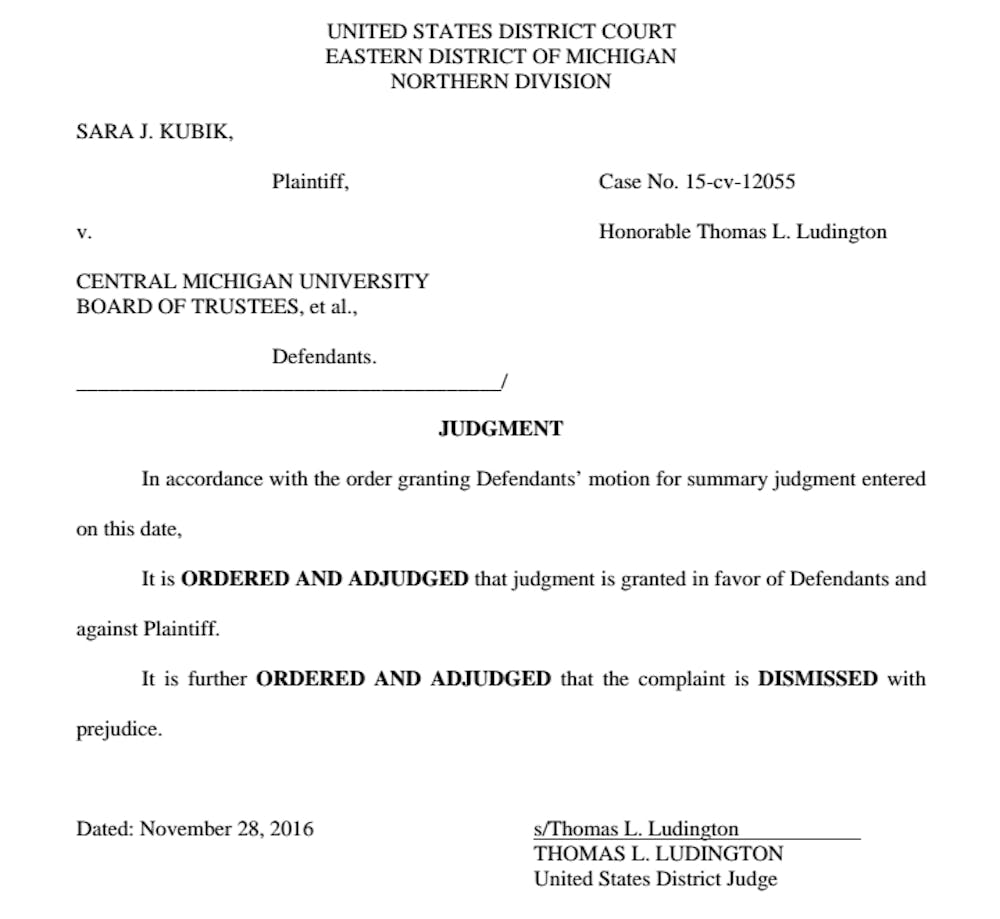Federal discrimination lawsuit filed by former CMU professor dismissed by judge

A screen shot of United States District Judge Thomas L. Ludington's decision regarding Sara Kubik v. Central Michigan University Board of trustees, et. al issued late last month on Nov. 28.
A lawsuit filed against Central Michigan University by former faculty member Sara Kubik alleging discrimination was dismissed Nov. 28 by U.S. District Judge Thomas Ludington.
Kubik said she was a victim of sexual discrimination, pregnancy discrimination and retaliation. Those named in the lawsuit included former College of Communication and Fine Arts Interim Dean Shelly Hinck, former Journalism Department Chair Maria Marron, journalism faculty members Lori Brost and Tim Boudreau and the CMU Board of Trustees. Boudreau is the faculty representative for Central Michigan Life’s Student Publication Board.
Ludington ruled that Kubik’s evidence of discrimination was not satisfactory.
“Even construing all facts in a light most favorable to Kubik, she has not satisfied her burden of showing that Kubik’s past complaints were the ‘but for’ cause of the negative recommendation,” Ludington wrote in his decision.
Kubik said she is looking over options to appeal the ruling and declined to comment further on the case.
In her lawsuit Kubik claimed she was not reappointed because she had filed complaints with the Office of Civil Rights and Institutional Equity. Kubik said she was denied a tenure extension during her pregnancy and harassed by Marron during her maternity leave. Marron contacted Kubik the day after giving birth to ask her about grading assignments, Kubik said.
OCRIE found Kubik had been discriminated against, and she was granted the tenure extension. She also filed a complaint with the Equal Employment Opportunity Commission in April 2014 alleging sexual discrimination.
In September 2013, the journalism department voted not to reappoint Kubik as a professor. That decision was overturned by former CCFA Dean Salma Ghanem and Provost Michael Gealt. The department voted again in 2014 to not reappoint Kubik.
During a 2014 meeting to reappoint Kubik, Boudreau questioned her about her EEOC charge and Kubik said she was accused by Brost of creating a hostile work environment by filing the complaint. Kubik alleged in her lawsuit that the decision to not reappoint her was retaliation for her discrimination complaints.
Kubik had been warned several times that her scholarship activities were insufficient, Ludington said. In the reappointment meeting, Kubik cited two articles she had published. The journalism department came to the conclusion they were not academic. Gealt, who overruled the department’s decision in 2013, also criticized her lack of scholarly progress in a January 2015 letter.
The judge noted that the discrimination alleged by Kubik came after concerns of her scholarship were raised.
“[T]he record most clearly supports the conclusion that Kubik was not recommended for reappointment because she had not demonstrated sufficient progress in scholarship even after being told that part of her application needed improvement,” Ludington wrote. “Even if Kubik’s complaints were a factor in the decision not to reappoint her, CMU had other legitimate reasons for that decision. And because Kubik’s non-reappointment was motivated by legitimate factors, she cannot establish liability.



